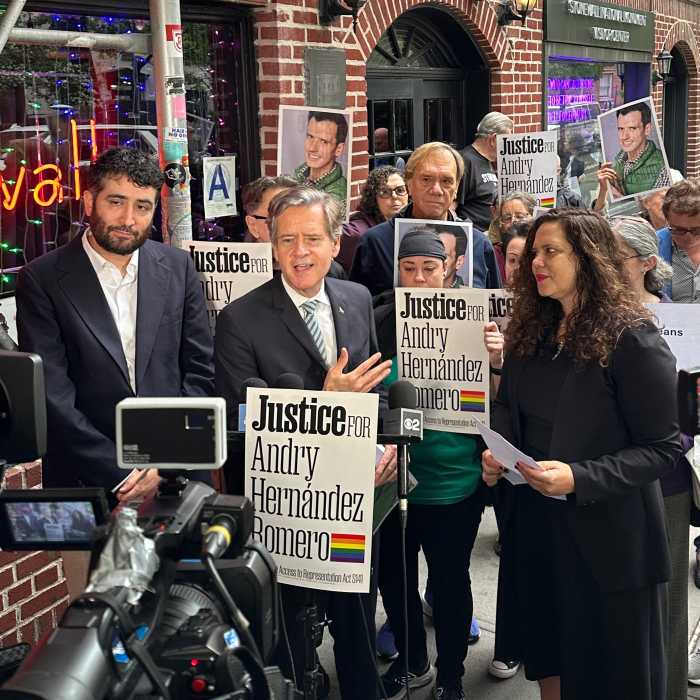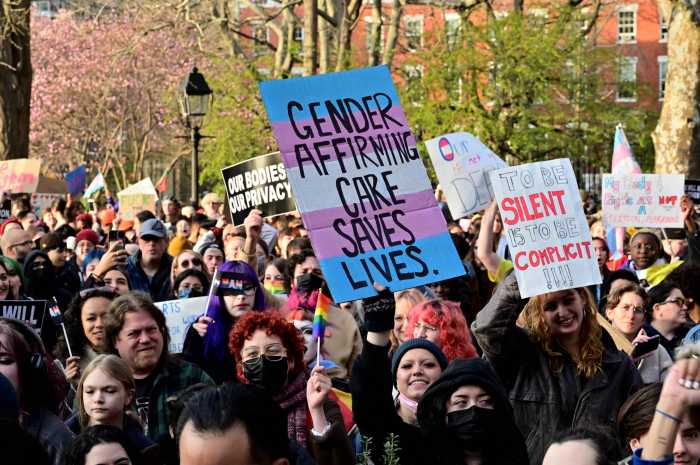Elio Di Rupo tapped for herculean task of healing Flemish-Walloon rift
BY DOUG IRELAND | When Elio Di Rupo was named Belgium’s prime minister on December 5, it was an historic first because he became the first openly gay head of government in a European Union nation.
The fact that Di Rupo — invited to become prime minister by King Albert II — was able to form a government at all was remarkable given the unprecedented 18-month crisis that had left the constitutional monarchy without a government and the country on the verge of breaking up. This protracted face-off reflected just how deep the divisions are between Belgium’s Dutch-speaking Flemish majority of 60 percent, concentrated in the wealthier north of the country, and the French-speaking Walloons, far more economically disadvantaged, who control the kingdom’s southern portion.
Di Rupo’s homosexuality — the 60-year-old politician first publically declared he was gay in 1996 — caused not a ripple in the Belgian media.
“There was nothing, absolutely nothing, about Di Rupo’s homosexuality in the media here, although in other European countries this historic first was commented upon,” one of the most respected foreign correspondents in Belgium, Jean Quatremer, told Gay City News by telephone from Brussels.
“Belgium is a Catholic country, but even the more conservative Flemish are fairly tolerant about people’s private lives, and Di Rupo’s been out of the closet for so long everybody knows he’s gay,” said Quatremer, the correspondent of the Parisian daily Libération and the author of three books on European Union affairs — Brussels is the headquarters of the EU — as well as of a well-regarded insider’s blog, “Les Coulisses de Bruxelles” (http://bruxelles.blogs.liberation.fr/).
“Di Rupo will show up at sporting events or concerts or the like with his boyfriend,” Quatremer said, “but nobody even bothers to notice if it’s the same one or a new one — there’s been absolutely nothing in the Belgian press about his companion. There might be if he wasn’t honest about who he is, but he’s not a hypocrite like Dominique Strauss-Kahn, so nobody cares.”
Zirlaene Berger, the executive director of Arc-en-Ciel Wallonie, the federation of LGBT organizations in the francophone part of Belgium (“arc-en-ciel” means “rainbow” in French), confirmed Quatremer’s perspective, telling this reporter, “There was absolutely no negative comment in the press here or attacks by his opponents” about Di Rupo’s homosexuality, “which went almost completely unmentioned.”
She pointed out, “We’ve had same-sex marriage here since 2003, gays and lesbians are included in anti-discrimination laws, and there are four other openly gay members of Parliament besides Di Rupo, as well as a number of openly gay mayors, city councilors, and the like.”
Berger explained, “Our gay pride marches have received municipal subsidies since they first began 16 years ago. It’s symbolic that at the first pride march in Brussels, there were about 2,000 people, but this year we had more than 50,000, including a lot of straight people.”
That’s a large turnout in a country of only some ten million residents.
Though Brussels has a gay commercial neighborhood called Kolenmarkt, nobody knows how large its gay community is. Belgium does not gather statistics on sexual orientation, according to gay activist Radouane Bouhlal, director of the Movement Against Racism, Anti-Semitism and Xenophobia (MRAX). Bouhlal estimated, however, that anywhere from ten to 18 percent of the city’s population is homosexual.
To be sure, Belgium is not free of homophobia.
“To be homosexual in Brussels [a largely French-speaking enclave of Flanders] is to be confronted with violence constantly,” wrote Brussels Secretary of State for Equality Bruno De Lille on his website earlier this year. De Lille is openly gay and in a relationship, yet he wrote that he cannot hold his partner’s hand in public without attracting insults, looks of disgust, and, at times, even physical violence.
In the face of such abuse, nearly one-third of all victims suffer psychological traumas, according to the Brussels-based Centre pour l’égalité des chances et la lutte contre le racisme, an organization that fights discrimination. There were 59 incidents of anti-gay violence officially reported to police last year, but many such attacks go unreported.
A nasty debate over who was responsible for this recent wave of anti-gay violence was opened earlier this year when a right-wing politician, openly gay Flemish Minister of Education Pascal Smet, blamed the gay bashing on recent immigrants from Muslim countries. Nearly a million of Belgium’s recent immigrants are non-Europeans.
Said, a young gay Belgian-Moroccan who directs the country’s intercultural queer organization, Merhaba, took exception to that perspective, telling the e-newsletter Expats, “Homophobia existed in Belgium before immigrants arrived.”
According to Said, who identified himself with only one name, “You can’t fight homophobia with Islamophobia. You fight it through education and raising awareness. You also need to fight against gender stereotypes and sexism, heterosexism, and heteronormativity that form the basis of homophobia.”
Said conceded, in the light of recent attacks on gays, that there are problems with attitudes toward homosexuality within immigrant communities. At the same time, he volleys back against those singling out immigrants for blame, especially when no effort is made to situate their behavior in a broader socio-economic context.
Belgium’s younger generation shows signs it does not fully accept homosexuality either. A 2009 study of 4,000 students carried out by universities in Antwerp and Hasselt, for instance, found that nearly ten percent of Flemish youth think that sex between people of the same gender is wrong and 20 percent wouldn’t want to be seen with a gay person.
In this context, the lack of any public fuss over Di Rupo’s open gayness may be attributable in part to his remarkable rags-to-riches personal story.
“My life is a fairy tale — you could not make it up,” he told his biographer, Francis Van de Woestyne, in a book published earlier this year, “Elio Di Rupo: Une Vie, Une Vision,” excerpts of which were published in the weekly Paris-Match.
Di Rupo was the last of seven children born to impoverished Italian immigrants from Abruzzi who traveled to Belgium looking for work. He was born and raised in a ramshackle, tar-brushed hut in the small Walloon village of Morlanwelz. But at the time of his coalminer father’s death in a traffic accident when Di Rupo was only a year old, his illiterate mother was too poor to support her numerous brood alone and placed his brothers and sisters in an orphanage, keeping only the baby future prime minister.
Even so, “I cannot say I had an unhappy childhood,” Di Rupo recalled. “With nothing, she gave us happiness. On celebration days, she would buy sandwiches that she cut in two.”
The Flemish press took note of the personal drive evident in the new prime minister’s Horatio Algeresque life: “If Elio Di Rupo dares to dream of a whole Belgium the way he dared to dream when he was 15 of having a better and freer life, then we’re not going to be in such bad shape,” wrote Wouter Verschelden, editorialist of the daily De Morgen.
Di Rupo earned a doctorate in chemistry from the University of Mons, the Belgian city where he was elected mayor in 2000. But it was as a student activist that he found his true calling, when at 15 he was bitten by the political bug and joined the Wallon Socialist Party.
As a student, “I was pretty much ‘peace and love,’ with long hair, flowered shirts, the whole bit,” he told biographer Van de Woestyne, but even though he was anti-establishment, his charm and brilliance, combined with a patient openness to others, led to his rapid rise. He was elected to the Mons City Council in 1982 — where he founded an International Festival of Films of Love that is still going strong — and then won a seat in Parliament just five years later.
Di Rupo was his party’s top vote-getter at the time of his election as a senator in 1991, and he went on to serve in a series of ministerial posts in the Wallonie governments — including as minister of education, audiovisual affairs, and public employment— and in 1994 became deputy prime minister and economics minister in the first federal coalition government between the Socialists and the Catholic Christian Democrats. He was also architect of a coalition government that made him minister-president — or governor, in US parlance — of Wallonie in 1999.
During the 1990s, the Socialists were rocked by a series of corruption scandals that left Di Rupo untouched. Thanks to his image as the party’s “Mr. Clean,” his undeniable oratorical skills, his winning personality, and his deft networking ability throughout his political career, he was elected president of the Socialist Party — one of the most powerful in Europe — in 1999, winning a whopping 71 percent of the vote against three other candidates.
As an anti-establishment reformer, Di Rupo got rid of party hacks touched by financial scandals and opened the party hierarchy to younger members, “feminized” the Socialists by recruiting women for many key posts, and crafted a “participatory democracy” that encouraged ideas for a “new socialist project” from the bottom up, which he then synthesized in a best-selling book. The formerly arteriosclerotic Socialist Party had a new kind of leader.
Di Rupo’s coming out came in 1996, while he was the federal government’s deputy prime minister, came at a moment when Belgium was in the grip of anti-pedophile hysteria provoked by serial killer Marc Dutroux, who was eventually convicted of the rape and murder of six girls between the ages of eight and 15 and said to be the mastermind of a child abuse ring. The long-running case — which included Dutroux’s escape from police custody — was widely viewed as having been bungled by a corrupt police force and judiciary. A famous White March of 600,000 Belgians took to the streets of Brussels to protest police incompetence in the Dutroux affair.
In this overheated climate, right-wing enemies of Di Rupo and of the Socialists generally tapped a network of police agents to coerce a young gay man, at that time wanted for theft from a male lover, into accusing the deputy prime minister, who had not yet come out, of having “abused” him when he was still a minor. The young man claimed videocassettes would show the two having sex. Two separate judicial investigations proved these accusations were pure fantasy, the videos never existed, and the young hustler in question eventually recanted, explaining police had blackmailed him into making the false charges.
On the day he was cleared, Di Rupo was pursued by a crowd of broadcast and print journalists in full feeding frenzy. He recalled the day for his biographer, the critical moment coming when one journalist exclaimed, “Yet they say you’re a homosexual!”
“I turned around and shot back: ‘Yes. So what?’ I will never forget that moment,” Di Rupo told Van de Woestyne. “For several seconds there was silence… People were so surprised by my reply they stopped jostling each other. You could have heard a pin drop. But it was a sincere, truthful reply.”
The unexpected honesty of Di Rupo’s answer — he was the first significant political figure in Belgium to come out in public — impressed the nation favorably, and just three years later he won election as Socialist Party president.
Di Rupo never allowed the difficulties of the 1996 controversy over his sexuality to impede his commitment to homosexual equality. As party president, he led a campaign for legal reform, integrating gay rights pledges into the party platform.
“We like Di Rupo not just because he’s gay, but because all of the progressive advances we’ve won from government — from gay marriage to homoparental adoption to anti-discrimination laws — we owe to him and the Socialists,” Arc-en-Ciel Wallonie’s Berger told Gay City News.
Di Rupo is something of a dandy — he is known for his trademark floppy red bow ties and favors dark pin-striped suits — but he now faces the greatest challenge of his career: saving Belgium from disintegration into two linguistically distinct entities. If his sexuality occasioned barely a word in the press, there has been much criticism over the fact that he speaks Dutch imperfectly. His principal political opponent, Bart De Wever, the ultraconservative demagogic leader of the Flemish separatist party, the NVA, whom polls show to be the most popular politician in Flanders, recently said, “My Nigerian cleaning woman, who’s only been in our country two years, speaks better Dutch than Elio!”
Last year, Di Rupo explained that it’s not that he hasn’t made an effort to speak better Dutch. An auto accident in which the airbag exploded while the windows were closed ruptured an eardrum.
“My ear no longer hears as well certain sounds, especially sharp ones,” he explained, “and while today I wear a hearing aid to try to limit the problem, I still have a problem with the melody of certain sounds, notably in Dutch.”
There are only two and a half years left until the next parliamentary elections, which does not give Di Rupo much time to unify the country. In fact, it was only under the pressure of ratings agencies like Standard and Poor’s — which in November reduced Belgium’s rating from AA+ to AA — that the six parties in Di Rupo’s fragile coalition were forced into an agreement.
Di Rupo had to pay a high price to form a government. There are not many new faces — 13 of his 19 ministers served in the last center-right coalition government — and the new Socialist prime minister was obliged to give all the ministries dealing with economic matters to the conservatives. Moreover, the 180-page government program hammered out in weeks of late-night negotiations includes commitments to drastically revise downward Belgium’s generous retirement pension policy and sharply cut back on its unique guarantee of unemployment insurance for life .
As Quatremer noted, “The very first thing a Belgian student does is sign up for unemployment benefits… This no-longer-affordable welfare state means the Belgians are among the highest-taxed Europeans, paying an average 50 percent of their salaries in taxes.”
The austerity budget plan Di Rupo was forced to adopt to forge his governing coalition with a raft of conservative parties is bound to sharply drive down his current popularity in opinion polls.
Can a gay, socialist son of Italian immigrants save Belgium? It could prove a tall order.
“If the separatists of the NVA win the municipal elections next October,” journalist Quatremer predicted, “his government could well fall and the country be permanently split in two.”


































